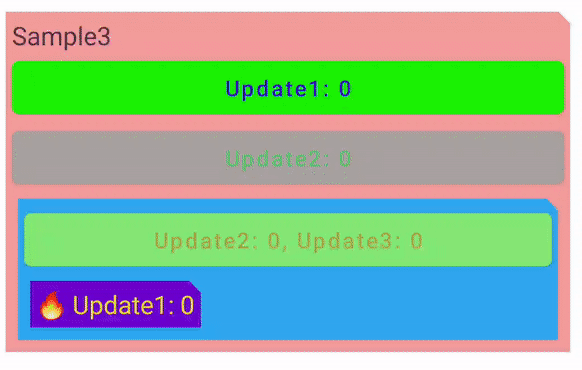To have smart recomposition scopes play a pivotal role. You can check Vinay Gaba’s What is “donut-hole skipping” in Jetpack Compose? article.
Leland Richardson explains in this tweet as
The part that is “donut hole skipping” is the fact that a new lambda
being passed into a composable (ie Button) can recompose without
recompiling the rest of it. The fact that the lambda are recompose
scopes are necessary for you to be able to do this, but not
sufficientIn other words, composable lambda are “special” 🙂
We wanted to do this for a long time but thought it was too
complicated until @chuckjaz had the brilliant realization that if the
lambdas were state objects, and invokes were reads, then this is
exactly the result
You can also check other answers about smart recomposition here, and here.
https://dev.to/zachklipp/scoped-recomposition-jetpack-compose-what-happens-when-state-changes-l78
When a State is read it triggers recomposition in nearest scope. And a scope is a function that is not marked with inline and returns Unit. Column, Row and Box are inline functions and because of that they don’t create scopes.
Created RandomColorColumn that take other Composables and its scope content: @Composable () -> Unit
@Composable
fun RandomColorColumn(content: @Composable () -> Unit) {
Column(
modifier = Modifier
.padding(4.dp)
.shadow(1.dp, shape = CutCornerShape(topEnd = 8.dp))
.background(getRandomColor())
.padding(4.dp)
) {
content()
}
}
And replaced
Column(
modifier = Modifier.background(getRandomColor())
) {
println("☕️ Bottom Column")
Text(
text = "Update1: $update1",
textAlign = TextAlign.Center,
color = getRandomColor()
)
}
}
with
RandomColorColumn() {
println("☕️ Bottom Column")
/*
🔥🔥 Observing update(mutableState) does NOT causes entire composable to recompose
*/
Text(
text = "🔥 Update1: $update1",
textAlign = TextAlign.Center,
color = getRandomColor()
)
}
}
Only this scope gets updated as expected and we have smart recomposition.

What causes Text, or any Composable, inside Column to not have a scope, thus being recomposed when a mutableState value changes is Column having inline keyword in function signature.
@Composable
inline fun Column(
modifier: Modifier = Modifier,
verticalArrangement: Arrangement.Vertical = Arrangement.Top,
horizontalAlignment: Alignment.Horizontal = Alignment.Start,
content: @Composable ColumnScope.() -> Unit
) {
val measurePolicy = columnMeasurePolicy(verticalArrangement, horizontalAlignment)
Layout(
content = { ColumnScopeInstance.content() },
measurePolicy = measurePolicy,
modifier = modifier
)
}
If you add inline to RandomColorColumn function signature you will see that it causes whole Composable to recompose.
Compose uses call sites defined as
The call site is the source code location in which a composable is
called. This influences its place in Composition, and therefore, the
UI tree.If during a recomposition a composable calls different composables
than it did during the previous composition, Compose will identify
which composables were called or not called and for the composables
that were called in both compositions, Compose will avoid recomposing
them if their inputs haven’t changed.
Consider the following example:
@Composable
fun LoginScreen(showError: Boolean) {
if (showError) {
LoginError()
}
LoginInput() // This call site affects where LoginInput is placed in Composition
}
@Composable
fun LoginInput() { /* ... */ }
Call site of a Composable function affects smart recomposition, and having inline keyword in a Composable sets its child Composables call site same level, not one level below.
For anyone interested here is the github repo to play/test recomposition